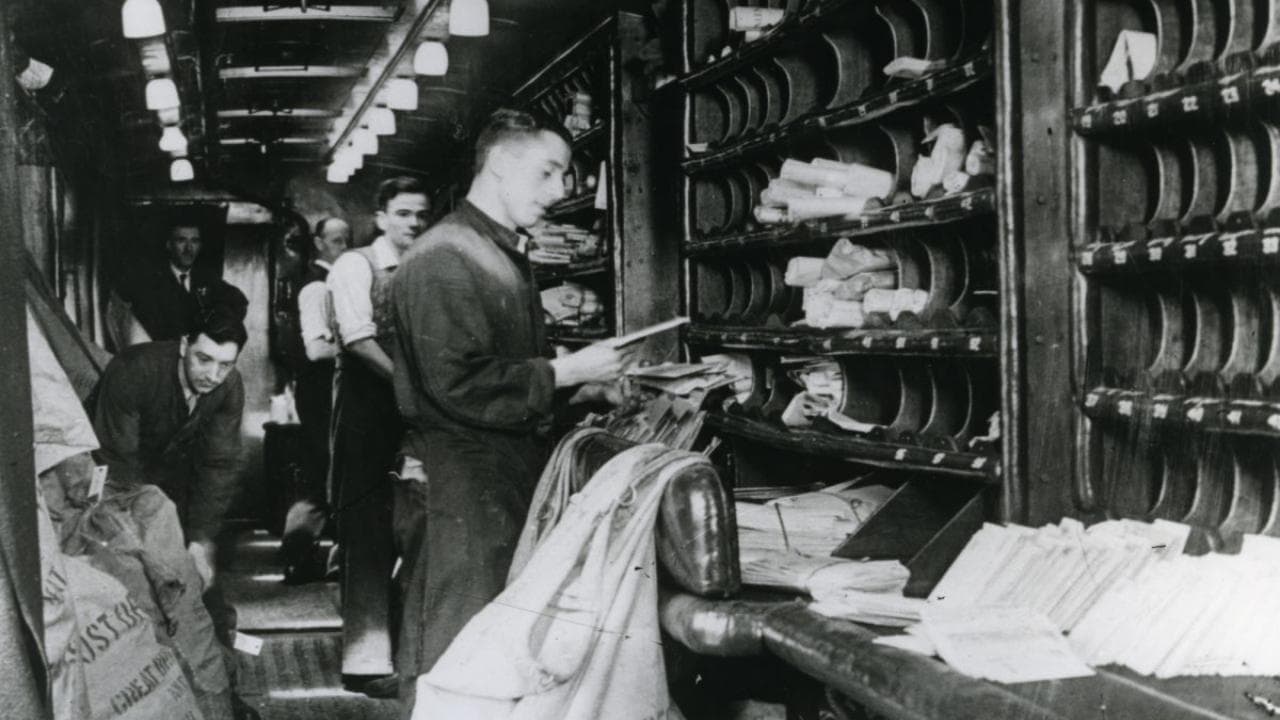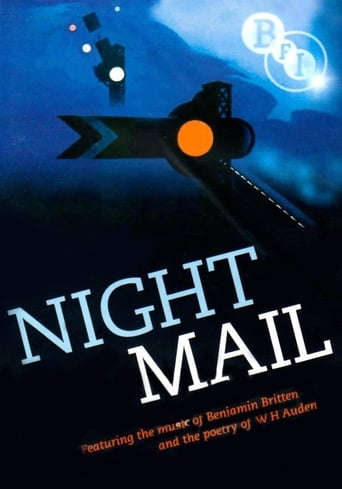

"Night Mail" is a British 25-minute short film from 1936, so this one has its 80th anniversary this year and is still in black-and-white of course. But it does have sound. This was the year when Nazis came into Power in Germany and politics became a huge issue in films in the 10 years after that. But here we still have a completely unpolitical film, which shows us how busy postal workers were already in the 1930s in order to make sure everybody gets their mail the next day. And "everybody" means Scots in this very case as this is where the train is headed and we see how people are working through the night to make sure the letters reach their mailboxes on time. I personally must say the contents in here are nothing too exciting, so I am a bit surprised that this film is a lot more known today than thousands of other movies from that time. Probably for sentimental value. I guess you must be a postal worked yourself or just be really interested in trains to appreciate this little documentary. I myself did not really and that's why I give it a thumbs-down. Not recommended.
... View MoreMade in 1936 (in black and white of course) NIGHTMAIL has become an icon of the British documentary movement. The budget was only £2,000 and the film was made as a promotional film for the Post Office services. The GPO film unit deserves a posthumous Oscar.The quality of directing, lighting and camera work in this documentary beats that of many of today's films and brings an almost Hitchcockian atmosphere and tension to the screen. This is the story of the Travelling Post office from Euston station in London to Glasgow in Scotland, in the days when the railways were efficient, frequent and run by proud workers who wore waistcoats, ties and hats and spoke politely to one another like the team that they were. It is surprising how old the men all seem now, in these days of youth culture, gentle character-full faces bearing no guile, tired and lined but proud and honest. The journey begins with the great spoutings of steam and turning of oiled wheels and the sound of banging doors, cries and whistles that emanate from all mainline stations and follows the trains from station to station throughout the night as they pick up mail along the way. A weird and wonderful Heath-Robinson device had been invented whereby bundles of post could be hurled onto a moving train as it passed through the station, propelled from a rope net on a pulley with such precise timing that it would land with a forceful thud onto the moving train. Long before emails and mobile phones had been dreamt of the only means of co-ordinating the system and ensuring safe delivery was the telephone, and this was used to perfect effect as the arrival of the Night Mail train would be phoned through from one station to the next down the line, accurate to the last minute, this being essential for the bundle to be aimed and "fired" at the right moment by those on the look-out. Rushing through sleeping towns and landscapes, main stations and rural ones, the efficiency of the Travelling Post Office and the men who worked on it throughout the night to get the post to its destination is awe inspiring. There is nothing mundane about it it almost has a spiritual quality about it not dissimilar to the night-life photographs of Brassai.The ultimate section of the film is positively inspired, when the score by Benjamin Britten is combined with the words of W. H. Auden in time to the sounds and rhythms of the train, making one want nothing more than to be on that train, to be part of the workforce, to be part of the team that works for the Night Mail that delivers the post to letterboxes all across England. It evokes the England of John Betjeman and of Alan Bennet, of strong tea and washing on lines, of lonely sheep and flint walls, of industrial chimneys and cloth caps, of invention and hard-work, of grand-fathers and family reunions, of childhood and of old age, when the work is done and stories are told of how it was.
... View MoreHere, courtesy of an excellent DVD from The British Film Institute, is the real-life counterpart of "The Flying Scot". Produced by John Grierson for the General Post Office Film Unit, brilliantly directed by Harry Watt and Basil Wright, "Night Mail" is a short account (25 minutes) of the special train literally a traveling post office that made a 365 nights-a-year journey from Euston station in London to Glasgow in Scotland in the 1930s and beyond. (The film was released by Associated British in 1936). With carriages staffed by the real mail sorters, it's impossible to separate the studio material from actuality. The only giveaways are the snatches of dialogue which have obviously been post-synced by professionals under the direction of Alberto Cavalcanti. True, in almost all cases, the directors have taken great care to cleverly obscure the mouths of the workers, but their accents are undoubtedly those of actors akin to the credited off-camera commentators, Stuart Legg and John Grierson himself.Many people have praised the Benjamin Britten score and the brief poem by W.H. Auden, but for me, the chief joys of the film lay in the cinematography by Chick Fowle and Jonah Jones. Just about the whole movie was shot at night as the train speeds through unusually bleak, blighted landscapes, which give this film a distinctive, noirish quality that is reinforced by the smelters, mills and smoke-stacks of Scotland's dismally sterile, impersonal and uninviting factory towns.
... View MoreThis film was made by the General Post Office (GPO) an organisation that has seen many manifestations and name changes since 1936. It depicts a near-utopian world populated by chirpy proletarians working through the night to sort and deliver the mail. The technology is ancient, steam trains, hand trolleys, manual sorting. Bags of unsorted letters are hung on the side of the railway line and caught by a mechanical grab as the train passes. Bags of sorted letters are similarly hung out of the train and caught in a net as it flashes by. The impression was given of extreme efficiency but I was struck by the lack of controls. If a bag missed the net, probably no-one ever noticed until it was found months later half-eaten in a field full of sheep along the railway line. The photography was excellent with lots of silhouettes against the night sky. The sound quality in the print I saw was poor but the dialogue given to the plucky workers was clunky anyway and largely not worth hearing. The voice giving the commentary had to be heard to be believed. My favourite character was the manager in a suit who wandered amiably down the train dispensing dubious advice. Some things never change. Night Mail is largely remembered today because of Benjamin Britten's and WH Auden's collaboration on the film but their contribution is limited to a brief section at the end.
... View More